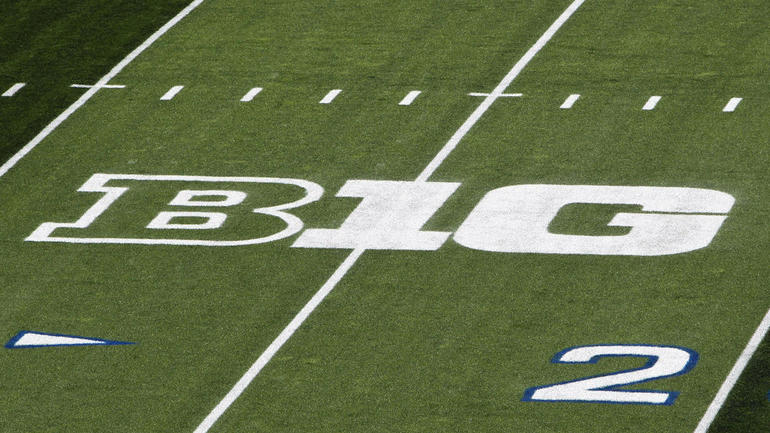
If Big Ten football will indeed be played this fall, as is currently scheduled, its athletes have a list of demands for their conference and the NCAA to implement.
In a letter penned through the Players' Tribune, more than 1,000 Big Ten football players expressed concern over participating in the upcoming football season while in the middle of the COVID-19 pandemic. The demands, outlined by College Athlete Unity, comes hours after the Big Ten announced its 10-game, conference-only schedule for the fall beginning on Thursday, Sept. 3. As part of that plan, the Big Ten released a number of medical protocols it will follow on top of the NCAA's minimum guidelines to give the league what it feels is the flexibility and safety to carry out the season.
Those protocols, however, apparently don't go far enough in the minds of Big Ten football players, who claim the "conference's proposal falls short in certain areas." Specifically, said players are asking for a more comprehensive plan from the NCAA and Big Ten to satisfy safety and well-being concerns.
"The NCAA -- which is known for its zeal for regulations and enforcement -- has had ample time to prepare for the safe return of its athletes to competition, yet it has done nothing," the CAU writes. "Its laissez-faire approach is forcing each conference and each school to create its own plan, resulting in inconsistent policies, procedures and protocols."
The Big Ten Unity Proposal includes a number of athlete safeguards, including but not limited to:
- Testing administered and enforced -- not just monitored -- by a third-party
- Penalties for noncompliance
- Adherence to WHO and CDC guidelines for all sporting events and compliance with federal, state and local regulations*
- Social distancing and mask requirements in and around athletic facilities along with temperature checks for anyone entering
- Quarantine rules for college athletes who test positive, and protocols for their return to practice and competition*
- In-season testing twice per week with an FDA-approved test with less than 1% false negatives*
- Testing within 24 hours from competition, and results within two hours of competition, with an FDA-approved test with less than 5% false negatives
- Whistleblower protection
- Banning the use of COVID-19 liability waivers*
- Automatic medical redshirt for any player who misses any competitions due to a positive test or a mandatory quarantine due to contact tracing
- Preserving athlete eligibility, scholarship, and roster spot for any athlete who opts out or cannot play more than 40% of the season*
- Coverage for all out-of-pocket medical expenses related to COVID-19*
- An adjustment to the cost-of-living stipend
* denotes Big Ten and/or NCAA have already implemented protocol
Another main sticking point for Big Ten players is the lack of consultation from NCAA and Big Ten leaders; however, Big Ten commissioner Kevin Warren did spend two and a half hours this week on a Zoom meeting, speaking with two athlete representatives from each of the conference's 14 schools.
Also of note, conferences such as the Big Ten have indicated they will honor scholarships for any players choosing to opt out of the season. However, the NCAA also released a statement Wednesday that each division must determine no later than Aug. 14 the eligibility accommodations for student-athletes who opt out of participating this fall or for those whose seasons are canceled or cut short due to COVID-19. The NCAA's statement also outlined a number of requirements for fall competition, many of which overlap the demands asked by Big Ten players. These include covering out-of-pocket expenses related to COVID-19 and adhering to specific guidelines for events.
The letter from Big Ten players is but the most recent example of athletes using their voice at a pivotal time in college athletics. Pac-12 players have also moved for greater protection amid the coronavirus pandemic, along with more sweeping demands ahead of the 2020 season in the #WeAreUnited movement. These demands include protection in all sports -- not just football -- a task force to fight racial injustices, distribution of 50% of total conference revenue to the players and softened transfer rules.
Unlike the #WeAreUnited movement built by the Pac-12 group, though, Big Ten players are keeping their demands strictly related to COVID-19 safety and are not threatening widespread opt-outs if they are not met.
















